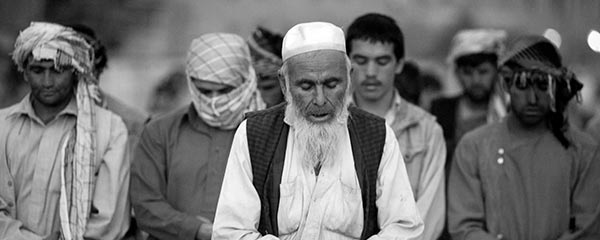WASHINGTON, D.C. -- About six months after the highly contested presidential election in Kenya, a majority of Kenyans (70%) told Gallup they thought the election was dishonest. As Kenyans, along with the rest of the world, heard reports of irregularities during the electoral process, including vote-buying, ballot stuffing, and data tallying issues and delays reporting the results, such a finding is not surprising.
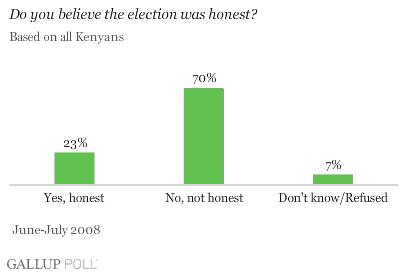
Violence broke out in several areas shortly after the Electoral Commission of Kenya announced that Mwai Kibaki, the incumbent from the Party of National Unity (PNU), had defeated Raila Odinga, the main opposition leader representing the Orange Democratic Movement (ODM). Although civil unrest had started a day earlier in Western Kenya to protest against reporting delays in some districts.
The Independent Review Commission (IREC), whose role it is to investigate the entire electoral process of last year's election, states in its report that Kibaki was "drawing his support mainly from the Kikuyu, Embu, and Meru communities," while Odinga had the support of the "Luo, Luhya, Kalenjin, and some smaller ethnic communities." In light of the importance of ethnicity in the development of Kenyan politics, information about candidates' ethnic support is particularly relevant.
The Gallup Poll findings from June through July 2008 show that among the top five ethnic groups in Kenya, which represent more than two-thirds of the national population (Kikuyu, 19%; Kalenjin, 15%; Luo, 13%; Luhya, 12%; and Kamba, 9%), the self-identified Kikuyu are the only group in which a majority (67%) say the presidential election was honest. Few self-identified Luo (1%), Luhya (3%), Kalenjin (12%), and Kamba (15%) respondents believe the election was honest. Also, almost one in five Kamba (18%) do not have an opinion, which is by far the highest percentage of "don't knows" among the top five ethnic groups.
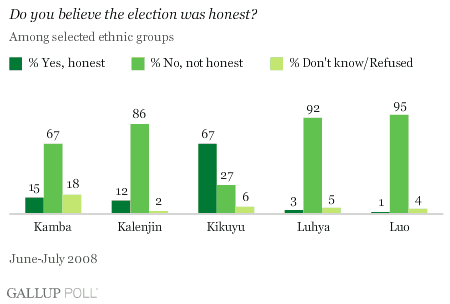
Ethnic attitudes toward the honesty of the election almost mirror the support that the top two presidential contenders draw from Kenya's provinces. (Click the Context tab to see a map that shows Kenya's provinces). In the Central province, a PNU stronghold, 73% of respondents believe the election was honest, while in the ODM-strong Nyanza and Western provinces, just 3% and 2%, respectively, say the same. In the Coast province, which has also supported the ODM ticket, only 3% of respondents believe the election was honest. In the mixed constituencies of the Rift Valley, Nairobi, and Eastern, 23%, 23%, and 29%, respectively, believe the election was legitimate. The sample size in the North Eastern province is too small to report the results.
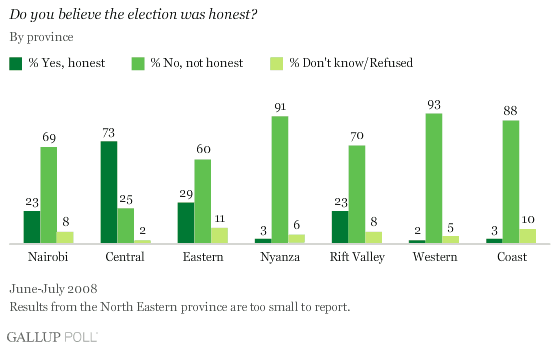
The Winner in Kenyans' Eyes
The IREC states, "the recorded and reported results are so inaccurate as to render any reasonably accurate, reliable and convincing conclusion impossible." Although Kenyans think the election was dishonest, a majority believe there was a winner.
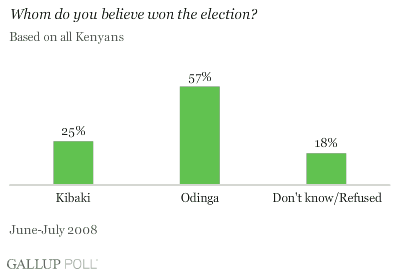
Ethnic attitudes toward the winner of the 2007 presidential election also mirror, for the most part, attitudes toward the honesty of the election. On the one hand, Kikuyu respondents (72%) believe Kibaki, who is a Kikuyu, won. (Although almost one in five do not have an opinion.) On the other hand, strong majorities of Luo (94%), Kalenjin (84%), and Luhya (78%) believe Odinga, who is a Luo, won the election. Among the Kamba community, many say they do not know who won the election, while 20% believe Kibaki did and 35% think it was Odinga.
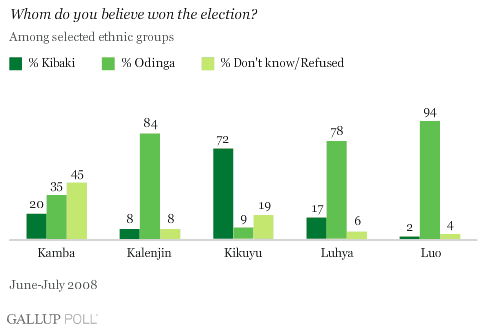
Similarly, across the provinces, attitudes regarding the outcome of the election align, in general, with attitudes toward the honesty of the election. Central is the only province where a majority of respondents (77%) believe Kibaki won. In Nyanza, Coast, Western, and the Rift Valley provinces, strong majorities (91%, 80%, 79%, and 64%, respectively) believe Odinga was the winner. In Nairobi, many respondents (48%) think Odinga won the election, but about one-quarter do not have an opinion. Finally, in the Eastern province, opinions are divided, with one-third who believe Kibaki won, another third think it was Odinga, and the remainder who say they do not know. Sample sizes in the North Eastern province are too small to report results.
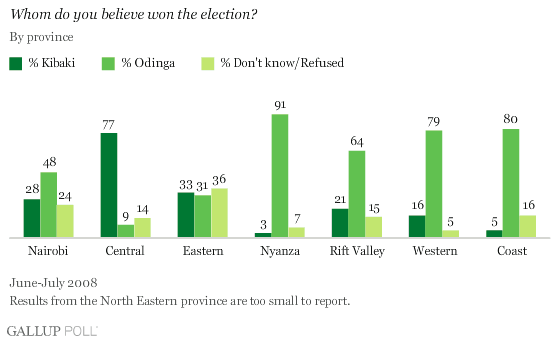
Views Toward the Electoral Process
Attitudes toward the honesty of elections, overall, are closely associated with perceptions of trust vis-à-vis the Electoral Commission. Before the December 2007 elections in Kenya, most had confidence in the honesty of elections (63% in 2006 and 55% in 2007). It is important to emphasize that Gallup conducted the 2007 poll before the crisis. Six months after the election and the violence that ensued, Kenyans' confidence in the honesty of elections had dropped to 22%. Similarly, public trust in the electoral commission experienced a large decline, from 60% in 2006 to 24% in 2008.
Across ethnic groups, the decline in confidence in the electoral process is widespread. Fewer than 10% of Kamba, Luo, and Luhya and 16% of Kalenjin say they have confidence in the honesty of elections. Among Kikuyu, only a slight majority (52%) say they do. Similarly, an autonomous electoral commission elicits the views of less than 10% of Kamba, Luo, and Luhya, while 40% of Kalenjin and only a plurality of Kikuyu trust the institution to be independent in its decisions.
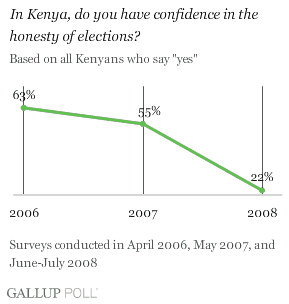
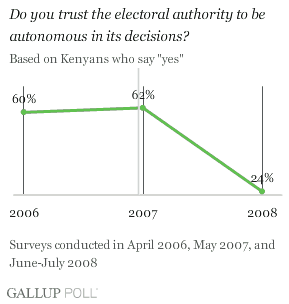
Bottom Line
Conventional wisdom usually highlights the ethnic character of politics in Kenya, and the poll findings suggest a strong ethnic identification with last year's electoral turmoil. Except for Kikuyu, most Kenyans across the other top four ethnic groups believe the presidential election was dishonest. At least on these questions, Kikuyu appear to be siding with the candidate of their own ethnicity, while Luo and other groups do the same.
But the overall steep decline in Kenyans' trust toward elections underscores the severe impact of the crisis on the institution that lies at the center of the process and serves as the impartial arbiter of elections. Taken together, the findings put into sharp focus the challenges ahead in rebuilding public trust to ensure that Kenyans' voices will be heard freely and clearly at the ballot box.
Survey Methods
Results are based on face-to-face interviews with 2,200 adults, aged 15 and older, in Kenya between June 16 and July 8, 2008. Results from the other two surveys are based on face-to-face interviews with 1,000 adults, aged 15 and older, in Kenya in April 2006 and June 2007. For results based on the samples of national adults in 2006 and 2007, one can say with 95% confidence that the maximum margin of sampling error is ±5 percentage points. For results based on the total sample of national adults in 2008, one can say with 95% confidence that the maximum margin of sampling error is ±3 percentage points. In addition to sampling error, question wording and practical difficulties in conducting surveys can introduce error or bias into the findings of public opinion polls.
